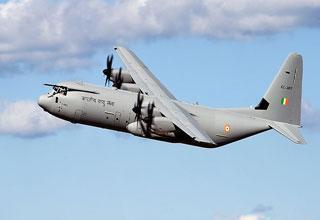
IAF's C-130J Super Hercules.
WASHINGTON (PTI): Over a million Chinese counterfeit electronics parts are being used in American military hardware, a key Senate Committee has warned, raising the possibilities that some of these fake parts may have been used in military jets which have been sold to India.
After a year long probe, the Senate Armed Services Committee said in a report that it had uncovered 1800 cases of fake parts used in military hardware mostly helicopters and aircraft.
The report highlighted that counterfeit parts may have been used in SH-60B helicopters used by Navy SEALS, C-130J and C-27J cargo planes and in the navy's P8A Poseidon's'.
The report could be alarming for India as it has purchased C-130J transport aircraft for the air force and P8A Poseidon surveillance aircraft for the Navy, in direct military-to-military sales. However, it was not clear from the report whether hardware sold to India had any counterfeit products made in China.
More than 70 per cent of an estimated one million suspect parts were traced back to China. "Our report outlines how this flood of counterfeit parts, overwhelmingly from China, threatens national security, the safety of our troops and American jobs," Senator Carl Levin, Chairman of the powerful Senate Armed Services Committee said in a statement as he released the report running into 72 pages.
"Our committee's report makes it abundantly clear that vulnerabilities throughout the defence supply chain allow counterfeit electronic parts to infiltrate critical US military systems, risking our security and the lives of the men and women who protect it," Ranking Member of the Committee Sen John McCain said.
The Committee criticized China for failing to shut down counterfeit manufacturers. "Counterfeit electronic parts are sold openly in public markets in China," the report said.
"Rather than acknowledging the problem and moving aggressively to shut down counterfeiters, the Chinese government has tried to avoid scrutiny," it added.
The affected parts in the C-130J and the Poseidons range from the chips in the display system of the Super Hercules to components of the detection systems in the P8A Poseidons.
The report including conclusions and recommendations were adopted by the Senate Armed Services Committee with unanimous voice vote on May 15.
The committee said that China denied visas to its staff to travel to Beijing as part of the investigation.
While the investigation focused on the risk that counterfeit parts pose to US national security and the safety of military personnel, the rampant theft of US intellectual property also severely impacts the US economic security.
According to the Semiconductor Industry Association (SIA), counterfeits cost US semiconductor companies more than USD 7.5 billion annually in lost revenue, a figure SIA says results in the loss of nearly 11,000 American jobs.
The other two largest source of fake parts were the United Kingdom and Canada. The Committee identified instances in which both countries served as resale points for suspect counterfeit electronic parts from China.
India accounted for about one per cent of the counterfeit products.The investigation also uncovered dozens of examples of suspect counterfeit electronic parts in critical military systems, including on thermal weapons sights delivered to the Army, on mission computers for the Missile Defense Agency's Terminal High Altitude Area Defense (THAAD) missile, and on a large number of military airplanes.
The potential impact of suspect parts on the performance and reliability of defence systems is significant. For example, according to MDA, if suspect counterfeit devices installed on the THAAD mission computers had failed, the THAAD missile itself would likely have failed.
According to the Navy, had counterfeit parts contained in electromagnetic interference filters failed on an SH-60B helicopter, the aircraft's ability to conduct night missions and surface warfare missions involving hellfire missiles would have been compromised, the Committee said.
The report said that in November 2010, when it notified Lockheed Martin, the US Air Force's prime contractor on the C-130J, of the counterfeit memory chip, L-3 Display System -- which manufactured them -- identified more than 400 assemblies affected by the suspect counterfeit memory chip.
However, Lockheed Martin decided not to take any action against L-3 Display System and the display units did not need to be returned for repair.
Interestingly, the report said that Lockheed Martin did not formally notify the Air Force of the suspect counterfeit chip in the C-130J, even though the company officials raised the issue with the air force personnel in a conference call.
The report said there is no indication in the write-up of the call that Lockheed Martin mentioned anything about the long-term reliability of the part.
Moreover, despite the statement in the SMT test report that said the chips were "suspect counterfeit" and "not considered to be factory original parts," Lockheed Martin's representatives apparently told the Air Force engineers that the "chips have been tested and found to be authentic but re-marked."
That distinction was apparently later repeated by Lockheed Martin personnel, leaving the Air Force with the false impression that the memory chip was not a counterfeit.
As late as September 2011, Stephen Horvath, Lockheed Martin's Chief Engineer for the C-1 30 advised the lead Air Force engineer for the C-130 that the part was "mismarked."
When asked by the Committee, Horvath could not explain what it meant to be mismarked or who might have been responsible for the mismarking, the report said.
 Previous Article
Previous Article Next Article
Next Article













The Indian Air Force, in its flight trials evaluation report submitted before the Defence Ministry l..
view articleAn insight into the Medium Multi-Role Combat Aircraft competition...
view articleSky enthusiasts can now spot the International Space Station (ISS) commanded by Indian-American astr..
view article